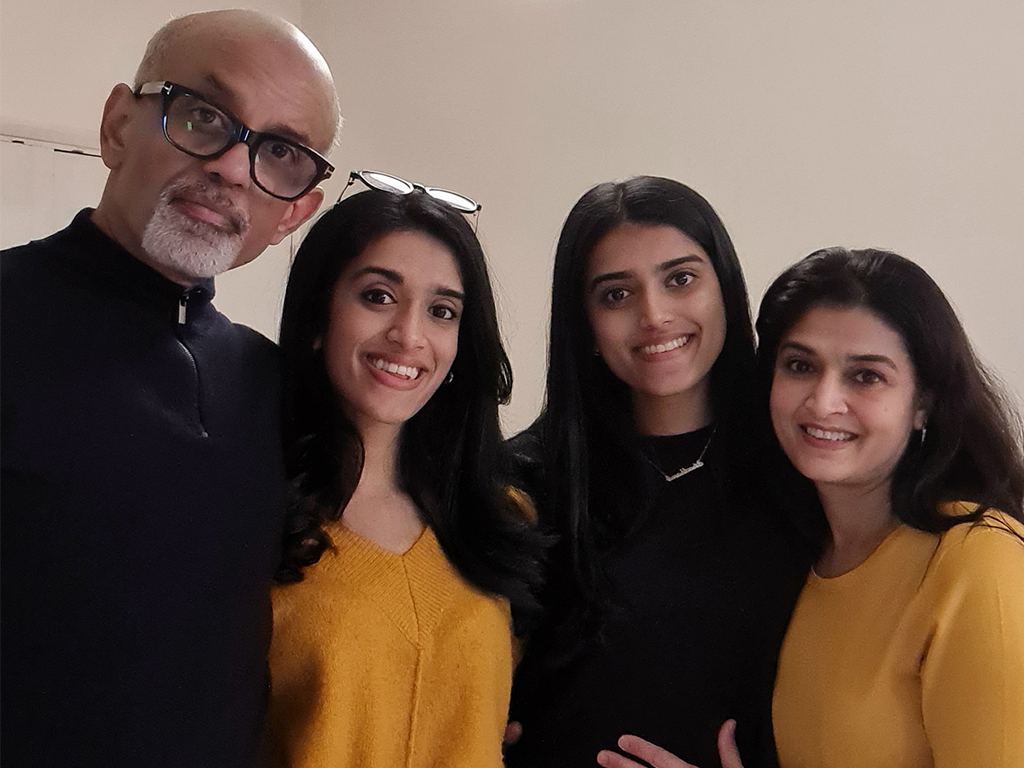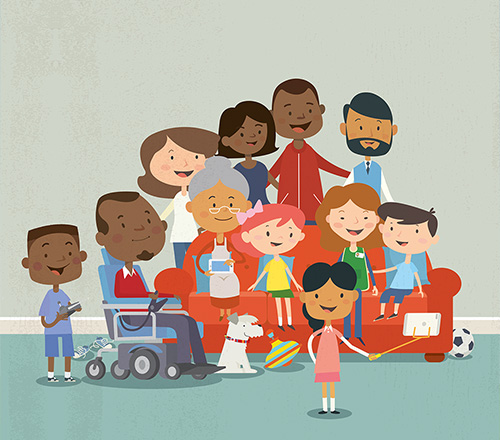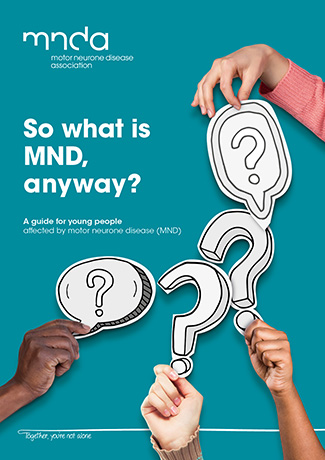If you are living with or affected by motor neurone disease (MND), there may be children or young people in your family. They may need help to understand the changes happening around them, but it can feel difficult to start these conversations.
We offer information and support for parents and guardians affected by MND.
Select from the following options or search for content by need with our:
Care information finder
"We're unsure what to say or do."
How do I explain MND to children?
It's natural to want to protect children from distress, but change is visible with MND. If left to their own imaginations, children tend to fill the gaps and may even blame themselves. Finding the right words to explain MND to children can be difficult, but we provide a range of resources for parents and guardians affected by MND:
- see our guide Telling people about MND for ways to open difficult conversations, including with children and young people
- see the option for Families, carers and children in our information for people with or affected by MND
- check our list of useful organisations and internet sites for services that support children and young people
- visit our web page for children aged 4 to 10 where they can find resources designed specially for them.
Our resources for children can help you open conversations with them about MND - see below.
MND Buddies activity hub
Our activity hub, MND Buddies, gently explains MND through games, stories and things to do. Children can even send in artwork and writing for display in the See it area, if they want to get creative. The MND Buddies characters help children to learn through play. This makes it easier for them to ask you about MND too. You can access the hub whenever you need to at: www.mndbuddies.org
MND Buddies is a safe space for young children, with no link back to our main website. While the activities are interactive, the site does not allow other people to message children.
"MND Buddies is easy to understand and has lots of fun things to do."
Storybook: Why are things changing?
Our storybook Why are things changing? contains three stories about families affected by MND. These gentle stories can help you prepare children for some of the early changes with MND. The aim is to help children start to adapt and feel involved.
"I think children will be comforted and even quite excited to see someone that looks like them or does similar things to them."
You can listen to the stories on the MND Buddies activity hub, in Know it or order the free printed storybook to use away from the screen, from our MND Connect helpline:
Telephone: 0808 802 6262
Email: mndconnect@mndassociation.org
Workbook: When someone close has MND
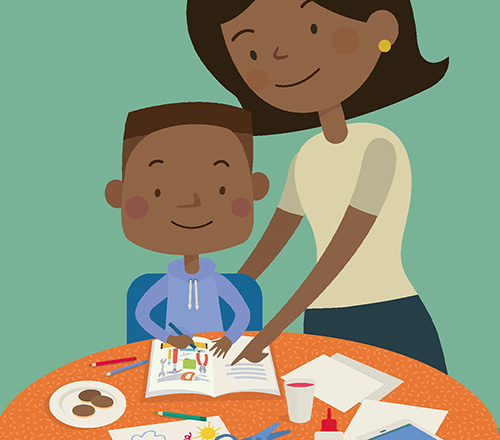
When children aged 4 to 10 are ready for more detail, we provide a workbook called, When someone close has MND. The information is age-appropriate, with activities to help them chat about how they're feeling. This can help them find ways to cope and adapt. Older children may also find the workbook useful, depending on their reading age and emotional maturity.
The workbook is designed with loose leaf pages for parents and guardians affected by MND, or a trusted grown-up, to use at a pace that feels right for each child. The content can help you communicate with children about some of the more sensitive aspects of MND.
"Before this, I didn't know where to start with my five year old."
Contact our MND Connect helpline to receive the workbook (orders must be made by an adult), telephone: 0808 802 6262 or email: mndconnect@mndassociation.org
My Treasure Box
This box full of little gifts and activities can help a young child aged 4 to 10 communicate and build positive memories about the person they love with MND. The box can be decorated and personalised too. To receive a Treasure Box, contact cyp@mndassociation.org
My Memory Box
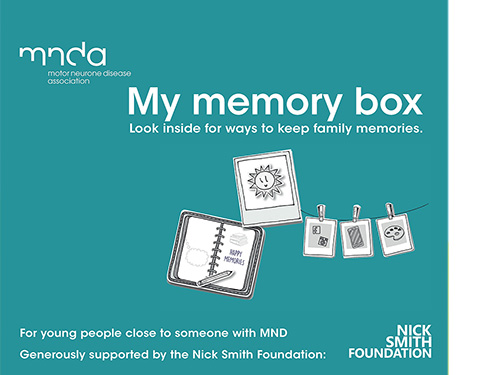
This box of gifts and activities can help a young person who is 11 years old or in their early teens communicate and build positive memories about the person they love with MND. The box can be decorated and personalised too. To receive a Memory Box, contact cyp@mndassociation.org
How do I explain MND to teenagers and young people?
As with younger children, we often want to protect teenagers and young people from upset. Yet they often know more than we expect. If they seek answers on their own, they may find alarming or incorrect content about MND, especially when searching online. We offer qualified information to help young people, and for parents or guardians affected by MND, discuss what's happening with MND. Our content is honest but written with empathy.
See our range of resources and reading lists to help:
see our guide Telling people about MND for ways to open difficult conversations, including with children and young people
see the option for Families, carers and children in our information for people with or affected by MND
check our list of useful organisations and internet sites for services that support children and young people
visit our web pages for young people aged 11 to 18 and young people aged 19 to 25 where they can find support and information.
The following guide may help you open conversations with young people - see below.
So what is MND, anyway? - guide for young people
Our guide So what is MND, anyway? can help young people and young carers find out about the disease and available support. Designed for teenagers, it may also be suitable for pre-teens, depending on their reading age and emotional maturity. It includes pages for notes and lots of shared experience from other young people close to someone with MND.
"If I had to go through it again, I'd want to know the background about the disease and the how and why. Also what happens next?"
Download the guide or see a web app of the guide below. You can also order a free printed copy of the guide from our helpline, telephone: 0808 802 6262
or email: mndconnect@mndassociation.org
So what is MND, anyway? - web app for young people
This version of our guide So what is MND, anyway? works like an app from an app store, but can be read on a wide range of mobile devices, smart phones and tablets.
It is free to use and best to download when using Wi-Fi. It will use about 5MB of space on your device, but can then be easily accessed whenever you want. Please note, if downloads are not covered in your mobile phone contract, you may be charged.
Instructions for download are provided when you open the web app.
My Memory Box

This box of gifts and activities can help a young person communicate about MND and build positive memories about the person they know with MND. The box can be personalised, Our printed guide So what is MND, anyway? is included.
Contact our MND Connect helpline to receive a Memory Box, telephone: 0808 802 6262 or email: mndconnect@mndassociation.org
How do we get support as a family?
At first you may just have questions that need answering. Contact our MND Connect helpline if you need to talk or would like guidance about our services, our regional support or wider services from other organisations.
We also offer family counselling in partnership with Barnardo's, to support children and young people affected by MND, or Kennedy's disease. If you would like to find out more, contact cyp@mndassociation.org
Over time, you may need more help.
"I feel anxious, inadequate and constantly torn between our daughter and caring for my husband."
You may find our pages for carers and family members useful, which include information about getting your needs assessed.
Our range of information for people with or affected by MND includes a drop-down option for families, carers and children. This includes helpful resources for parents and guardians affected by MND, with:
- overviews about the disease
- how to manage difficult conversations
- how to access available support (including care support, relevant benefits and financial support)
- resources designed for children and young people.
See the first two drop-down options on this webpage to find out about our resources for children and young people.
Contacting our MND Connect helpline about family support or counselling for children or young people
See our helpline contact details at the bottom of this page or find out more about MND Connect on their own page. The team provide support, information, and guidance on our services, including help for parents and guardians affected by MND. They can also listen if you just need to talk. The helpline also assists health and social care professionals who provide support to families affected by MND.
The team also operate our helpline for young people:
Helpline: 0808 802 6262
Email: mndconnect@mndassociation.org
"The fact that your helpline can be contacted by young people as well as adults is the best part. You're here for us too."
We also offer family counselling in partnership with Barnardo's, to support children and young people affected by MND, or Kennedy's disease. If you would like to find out more, contact cyp@mndassociation.org
For 24-hour emotional support, up to the age of 19, children and young people can also contact:
Childline
Helpline: 0800 1111
Website: www.childline.org.uk
How do I provide support if I'm a professional?
If you are a teacher, social worker, or a health or social care professional, we are here to help you too. See the drop-down option above if you need to contact our helpline, MND Connect.
When someone is diagnosed with MND, support for the whole family is important - especially where children and young people are involved in care tasks, becoming young carers. Where professionals work together, with permission from the family, it can be of huge benefit.
Understanding and support at school or college is of major importance for children and students who experience MND in their family.
"It's very difficult trying to study for A-levels, keep up with friends, look after my dad and help mum look after him too. I feel a lot of responsibility and think about things that wouldn't even cross my friend's minds." Young carer
We provide information for people with or affected by MND, which includes a drop-down option for families, carers and children.
We also provide the following resource, designed to assist you: Supporting children and young people
See the first two drop-down options on this webpage to find out about our resources for children and young people.
Useful organisations and contacts for children and young people
The following list gives examples of the organisations and contacts that offer support for children and young people. This list will help get you started - or contact our Young Connect helpline, as explained in the drop down option above. The helpline team can guide you to our own services and other organisations as needed.
We provide links to wider organisations that may also help for parents and guardians affected by MND.
Emotional support for children and young people
Childline - Tel: 0800 1111
24-hour emotional support, offering confidential live chat.
Hope Support Services - Tel: 01989 566317
Online emotional support for children and young people aged 11 and over facing a family health crisis offering Skype, email, one to one and peer support. Email: help@hopesupportservices.org.uk
Kooth
Online chat with qualified counsellors.
Student Minds
Emotional wellbeing support for students.
Young Minds - Tel: 0808 802 5544
Support for the emotional wellbeing and mental health of children and young people. Mon- Fri 9.30am – 4pm Email: ymenquiries@youngminds.org.uk
The Mix
An online guide to life for 16-25 year olds in the UK, offering non-judgemental support and information.
Support for young carers
Carers Trust
Support for carers and young carers. Email: support@carers.org
Go Beyond - Tel: 01822 811020
Free respite breaks for disadvantaged children, including young carers, from all over the UK. Email: info@chicks.org.uk
The Children's Society - Tel: 0300 303 7000
Help for young carers with details about the annual Young Carers Festival and young carers’ groups on the website.
Bereavement support for children and young people
Winston's Wish - Tel: 08452 030405
Support for bereaved children, young people and their families.
Child Bereavement UK - Tel: 08000 288840
Support to help families rebuild their lives when someone close to them dies. Email: support@childbereavementuk.org
Hope Again - Tel: 08444 779400
Support, advice and information for children, young people and adults when someone close to them dies. Email: helpline@cruse.org.uk
Grief Encounter - Tel: 02083 718455
Bereavement support for children and young people. Email: support@griefencounter.org.uk and ecounselling@griefencounter.org.uk
Tell us your thoughts on this web page
Page last updated: 28 February 2025
Next full review: February 2027
